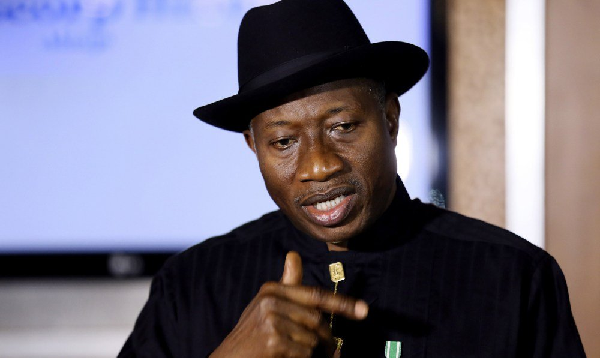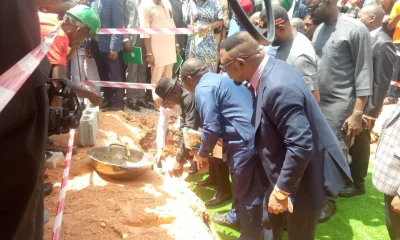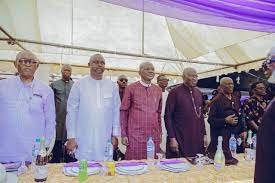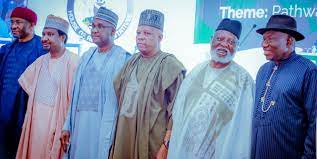OPINION
Jonathan, Buhari Cuckolding in War Time
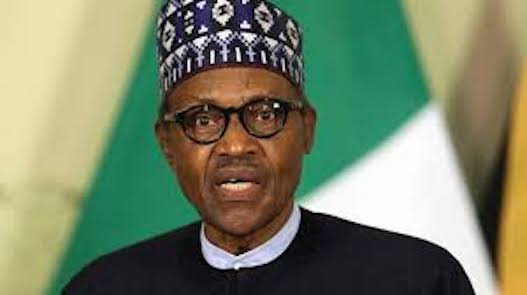
By Festus Adedayo
Last Wednesday, Muhammadu Buhari and his newfound friend, Goodluck Ebele Jonathan, locked each other inside the sacristy of the Nigerian presidential Villa, christened Aso Rock. When they came out afterwards, both wore the visage of 3-year old Syrian girl, Salwa and Cuckold, a 1997 book written by Indian, Kiran Nagarkar.
Cuckold, a historical novel patterned after the narrative of Maharaj Kumar, may in a way explain the recent hot and adulterous romance between Jonathan and Buhari.In the book, Kumar had attempted to win his wife, Mira’s affections in the midst of a ravaging war in the land. Set in the Rajput kingdom of Mewar of the 16th century, a wife named Mirabai refuses to see Mewar prince, Bhoj Raj, as her husband but thinks instead of Lord Krishna as her hubby.
Originally derived from the bird called cuckoo which has the tendency of laying its eggs in other birds’ nests, right from the Middle Ages, cuckolding became an allusion to a man or woman who has sex with an already married partner, sometimes out of wedlock and at other times, as a fetish where some married partners derive voyeuristic joy in watching their spouse engage in sexual liaison with another.In 2010, Salwa caught the headlines after a trending video recording of her playing a game and laughing rambunctiously as warplanes dropped bombs very close to her home in Idlib, Syria. Idlib was Syria’s final major rebel-held stronghold region where Turkish-backed rebels and Syrian government forces fought in an atrocious battle to destroy each other. The world was aghast at what was perceived as Salwa’s emotion-dead response to destruction and death. It was later that her father, Abdullah Mohammad, told the world that he taught Salwa wartime laughter; that, rather than being scared at the sight and sound of deafening, frightening and destructive air strikes, she should deaden her fright with laughter, as a counterpoise and coping mechanism. He purchased fireworks for her and got her immersed in its frightening noise. With this, Abdullah taught Salwa that both – bombs and fireworks – were synonymous and loud noises, rather than creating fright, could be funny. It helped Salwa stay calm as cannons and bombs wreaked their havocs.
Dressed resplendently in blue colour traditional Ijaw attire, with a black bowler hat to match as picture from the presidency depicts, Jonathan and Buhari both cut the image of two unequally yoked afflictions besieging a single household. Traditional Yoruba call such Ile njo, ole nja – a household on fire and at the same time invaded by burglars – which keep onlookers guessing as to the depth of the unwanted guests’ incestuous relationship. Buhari was also dressed in a cocaine-white babanriga and cap to match. They both saluted each other in the COVID-19 elbow-jamming manner. Barely disguised but hidden behind their visage was a cheerfulness that made them look like a girl who titivates her hair with sequins on her first date.
What is the relationship between laughter and war? Put differently, is laughter permissible at times of war, when there is so much death and destruction? In all histories of war, this unequally yoked binary has always maintained an uneasy relationship. Kaiser, the German imperial power in the First World War, would not hear of such incestuous relationship between war and laughter. In a telegram to the Mayor of Berlin during the war, he demanded seriousness and self-constraints. Indeed, the Kaiser and German military of WW1 pronounced urban laughter a taboo during the war. The bleakness of war should make impossible all joy, they said. What manner of amusement can there be when death and suffering are going on at the war front? How can humour be legitimate in the city in times of war? This was why Carl Braun, also known as Carl Hobner, ran into trouble with the Berlin police in October, 1914 when he humorously mimicked German generals and dignitaries while the war was going on. For the Kaiser, pubs, amusement parks, theatres and cinemas should all be closed in war time.
That was not for Jonathan and his ‘fiend,’ the president. Judging by the discourses on parade in the political arena, Buhari and Jonathan, two hitherto sworn political enemies, must have come together to discuss 2023. They have held a couple of such. On the superficial, however, Jonathan, ECOWAS’ special envoy, had struttled into his former abode at the presidential palace to discuss the crises-ridden West-African country of Mali, with Buhari. But pray, are Mali’s crises more than Nigeria’s and who is the Nigerian problem being reported to?
But why would Buhari and Jonathan be discussing 2023 when there is war in Nigeria? Make no mistake about it: Nigeria is in a time of war. Shrouded official figures of Boko Haram killings of Nigerians and their soldiers number hundreds; bandits slaughter scores daily in the Northwest; farmers cannot go to till the land for fear of being strafed to death by bandits’ AK-47 bullets; in Niger State, Boko Haram has ceded Nigeria’s territory to itself, pegging girls’ marriageable age at 12. Nigeria is at war. Her economy, even at the thick of the Biafran war, possessed more verve than the economy under Buhari. The Nigerian Naira is periodically sighted at red light districts, in undisguised dalliance with the Zimbabwean dollar and Congolese Franc, the three barely clad and smiling seductively like coquettes of nil worth that they are. Hopelessness had never been this proximate to more than half of Nigerians in almost a century. Should Nigerian leaders then be exchanging mutual political conviviality, like imperial powers partitioning Africa at the 1884 scramble for the black continent, ceding out and receiving presidential power, in this time of war?
With the 2023 election in the neighbourhood of a little over 12 months ahead now, permutations, alignments and projections are being shuffled like stock traders do on the floor of the stock exchange. Grapevines are rife with claims that President Jonathan is being lured by the rank of his old political adversaries to run for the Nigerian presidency again. On the face value, this proposition sounds very stupid, illogical and otiose. Why would those who ganged up to make the Ijaw-born ex-president’s name worthless a few years ago, be the same people he is embroiled in playing tombola with today?
Rivers State governor, Nyesom Wike, took the dalliance between Buhari and Jonathan beyond hearsay when he warned Jonathan recently not to yield to the pressure to contest the presidency under the APC, same party that nailed his coffin in 2015. Speaking to the BBC, he said, “If I see the former President, I will tell him what I heard. I will tell him, don’t go anywhere because these people want to destroy your reputation.”
The calculation is said to be one of the dirty power gimmicks of the North to swiftly return to power if it eventually gets supplanted by a southerner in 2023. Surveying the horizon with a clean but selfish toothcomb, Ahmadu Bello’s progenies were said to have discovered, to their chagrin, that unless someone constitutionally barred from a second term was sneaked into Aso Rock, their fated birthright of Nigeria’s presidency could suffer on the sidelines for another eight grueling years. The most fitting sucker who can act as stand-in and take the bullet for such infernal project was a man the same Northern elders had tar-brushed as clueless, feckless and a recklessly irredeemable drunk whose life was incomplete without shots of liquor.
With the connivance of Ahmed Bola Tinubu’s octopodal media machine, by the time Jonathan was going into the 2015 presidential election, the Buhari/Tinubu machine had mortally damaged his brand, rendering the name Jonathan as worthless as a degree from Trump University. The theatrics of dollar-baiting Yoruba traditional rulers who pointed effete traditional insignia at Jonathan’s head, with him kneeling down in their midst, ostensibly for traditional invocation for his success at the polls, was by them a mere alupaida – fraudulent stunt. His wife, Patience, was visited the most visceral denigration in history, so much that she had less worth than a horoscope. Today, other than a recent unexplained taciturnity she recoiled into, there was no embarrassing infraction committed by Jonathan’s wife that Buhari’s voluble Captain of Zi Oza Room has not. But, is it cluelessness, lust for power or outright unintelligence that will make a man, as the Yoruba will say, return to bid a hostile host good evening, in the same unwelcoming home where he was booed out and forced to say good night awhile ago?
Aside the fact that the Nigerian politician’s heart is reputed to be painted in red colour like a mass of scarlet berries, these politicians are certified gang of brand conmen. We were living witnesses to how then General Buhari, who we all knew for his intolerance to voices of dissent, with an Antarctica-like frozen views on national development, suddenly became branded as a born-again democrat. They put on him borrowed robes, forced him to wear agbada and Igbo Ishiagu, apparels of two people he never disguised his disdain for, while forcing him to dance to the adulterous music of Wasiu Ayinde on the campaign rostrum. Here was a man Nasir el-Rufai, in 2010, referred to as “an almost-70 principal (who) should retire,” a man he said was “perpetually unelectable” and who suddenly got deodorized and presented to the people as Angel Gabriel. El-Rufai, in that same statement, warned Nigerians that “a Buhari, the new Democrat, tolerant of views different from his own, is yet to evolve.”
As we were wondering how APC, PDP will navigate us into this potentially doomed Jonathan mis-presidency, another artful dodger climbed up the rostrum. Serial presidential aspirant, Turakin Adamawa, Atiku Abubakar, last week dismissed the zoning of presidential ticket debate as response to the current Nigerian leadership crisis. He made this known at the 94th National Executive Committee (NEC) of the PDP held last Thursday. “Where the president comes from has never been the problem of Nigeria, neither will it be the solution. There is no such thing as the president from Southern Nigeria or president from Northern Nigeria. There is only one president from Nigeria, by Nigeria and for Nigeria,” he said.
In the ecology of Yoruba’s dismissive estimation of people who fail to dispense with old analogies and embrace recent discourses, such persons are seen as being busy engaged with culinary masturbation by eating an agbonrin esin – one-year old venison. With this thesis that is irrelevant to the reality of today, Abubakar is apparently devouring this old, uninspiring agbonrin esin. In an earlier piece, I prophesied that Buhari may be the last Nigerian president. I didn’t mean that Nigeria may not exist, post-2023 but that we can never have a president who will think Nigerian or a Nigerian thinking at the presidency any longer. Buhari has so mortally destroyed that thesis of “where the president comes from has never been the problem of Nigeria” with his unexampled nepotism in office, so much that where the president comes from matters greatly now. In any case, shouldn’t Nigeria have now moved out of this perennial Atiku Abubakar presidential hustling to something more ennobling?
If you add this to Jonathan and Buhari’s embarrassing cuckolding in this time of war, you will have the complete picture of a Nigerian circus that has just begun yet another season of our anomie.
Malami’s State of Emergency and Chiwetalu Agu’s arrest
Either out of acute ignorance of the law, diffidence towards it, naivety or a consuming passion to appear hyperactive in the eyes of Aso Rock, the Nigerian security establishment will not stop exuding sickening optics in its operations, to the shuddering embarrassment of the world. Last week, it was another time for the advertisement of this gross lack in mental capacity. Nollywood star, Chiwetalu Agu, was arrested by some officers of the Nigerian Army at the Upper Iweka, Onitsha, Anambra State. His sin and as could be seen in a viral video, was adorning flowing apparel that had Biafra insignia on it.
In the video, Agu stood in a moving traffic in the commercial city, beside a bus painted green, the Nigerian colour and which had written on it, Chiwetalu Films. Shortly after, a soldier appeared, clutching a gun, in a menacing mode, his hand clutched to the rifle’s butt. All of a sudden, other soldiers appeared, held Agu roughly, even as he almost fell, dragging the actor like a sack of tomatoes, ultimately pulling and heaving him into a truck. He must have fallen a couple of times in the process. Before zooming off in a commando style with their prized victim, the soldiers fired repeatedly in the sky which resulted in a melee as people scampered for dear lives. Agu was said to have come to Onitsha on a charitable mission of sharing food items to the less privileged.
Later on, the Nigerian Army issued the raison d’être for this sickening assault. Agu, it said, was inciting the public and soliciting support for the Indigenous Peoples of Biafra, (IPOB). In a statement issued by the Director of Army Public Relations, Brigadier General Onyema Nwachukwu, the Nigerian Army denied this globally viewed scene of brutalisation by its men, claiming that Agu was gently taken into custody.
“Dressed in a very well known attire of the proscribed group, Chiwetalu Agu was picked up for questioning while inciting members of the public to join the proscribed group. Though he attempted putting up some resistance when troops made effort to take him into custody, he was not assaulted or subjected to brutalization,” Nwachukwu said. The Nigerian Army then urged that people’s expression of their rights “must be done within the confines of the law, bearing in mind the imperative for peace, and national security.”
Released after 24 hours in the Army’s custody, the Department of State Services (DSS) will not be left out of the binge to impress Aso Rock. It reportedly re-arrested Agu last Friday. This was confirmed in a statement by the DSS Spokesman, Peter Afunaya, who said on Friday that “Army brought him to us. Justice will take its course.”
The day before Agu’s arrest, specifically Wednesday last week, Minister of Justice and Attorney-General of the Federation, Abubakar Malami, riled the country with another of his celebrated badly-rehearsed statements that brim with sickening flavor of partisanship. Speaking to the press after the Federal Executive Council (FEC) meeting, Malami said that, in response to the upswing in cases of violent attacks on individuals and government facilities in Anambra, with the approaching governorship election in the state, “you cannot out rule possibilities, inclusive of the possibility of declaration or state of emergency.”
One nexus links Chiwetalu’s arrest and Malami’s unconscionable statement: they cannot be supported by logic and common sense. Oduduwa is an insignia that Sunday Igboho and his separatist crew use as mascot. If the FG descends into another of its jaundiced decision to outlaw it, Yoruba people shouldn’t use the insignia of Oduduwa? What part of the Nigerian constitution forbids anyone wearing clothes or the colour combination that they desire? What evidence did the Army have that Agu incited the public on the side of IPOB? Agu has been known to always go nostalgic in references to Biafra. Yes, the Federal Government claimed it had outlawed IPOB, but did it outlaw Biafra? Biafra is a phoenix that cannot die, as long as the people in that geographical area remember their grueling fate in the hands of Nigerian soldiers.
Again, Agu is an actor and the Upper Iweka show might jolly well be a rehearsal for another film, as indicated by the vehicle he brought to the alleged locus incuo. More fundamentally, why has the Army never felt that Sheik Gumi, who even accused it of systemic decimation of Islamic faithful, had breached “the imperative for peace and national security” thus necessitating the arrest of that campaigner for bloodthirsty hounds?
It is same partisanship that juts out of Malami’s emotive outburst. In the Southeast of Nigeria today, Imo State is where anarchy and total breakdown of law and order are mostly pervasive. That is a state superintended over by one of Aso Rock’s provincial lickspittles. How come the federal government has not declared a state of emergency there? A sizeable part of Niger State is in the hands of Boko Haram, while the president’s home state of Katsina appears to be Thomas Hobbes’ projection in his state of nature thesis. How come these states haven’t fallen victim of the emergency rule?
While most of these theoretical postulations by government are not wrong in themselves, the absence of equity in their operationality is the bother. In 1999/2000 when Gani Adams’ OPC was constituting a nuisance, Olusegun Obasanjo wielded the big stick, slamming him and Fredrick Fasehun, his own kinsmen, in jail for months. Buhari cannot be hounding IPOB and ethnic separatists while mollycoddling his bandit brothers who he has stubbornly refused to label terrorists.
Festus Adedayo is an Ibadan-based journalist.
OPINION
For Akpabio, a Teachable Moment
By Olusegun Adeniyi
Senate President Godswill Akpabio is renowned for his arrogance and hubris. So, when he tendered a public apology to Senator Natasha Akpoti-Uduaghan on the floor of the senate Tuesday, the stakes must have been very high.With a faceless but popular blogger running a vicious campaign against his family and threatening not to stop until Akpabio apologised to a female colleague he needlessly demeaned, it was obvious something would have to give.
And the public statement, issued by a group of powerful women on the same issue, must have persuaded even a man like Akpabio that he had carried his offering beyond the sacred place. The controversy began when Akpoti-Uduaghan attempted to speak before being recognised, an action that drew sharp reprimand from Akpabio. Despite her apologetic tone, Akpabio would not let it pass. He retorted with the biting remark that the Senate is not a “nightclub”.On Tuesday, Akpabio said, “Distinguished Senator Natasha, I want to apologise to you…I do not mean any harm. People should concentrate on things that will move this country forward. Social media handlers should practice with decorum. We won’t out of anger regulate social media.”I am impressed by how Akpabio handled this situation. Many Nigerians still recall his altercation with Dr Joy Nunieh in the Niger Delta Development Commission (NDDC) during his stewardship as Niger Delta Minister.But it is unfortunate to hear that Akpabio’s wife was dragged into what does not in any way concern her. Those who purportedly called to denigrate her exhibited the same traits they accuse Akpabio of. They obviously have no respect for women. No matter how we feel about issues, certain lines should not be crossed.On Monday, 24 hours before his apologies, a group of respected female professionals in the country under the aegis of Voices for Inclusion and Equity for Women (VIEW), released a public statement on what they described as a “disheartening display of disrespect and gender bias” by Akpabio.Signatories included Aisha Muhammed-Oyebode, Aisha Waziri, Amina Salihu, Asmau Joda, Ene Ede, Ene Orgah, Fatima Akilu, Ier Jonathan-Ichaver, Kadaria Ahmed, Larai Ocheja Amusan, Mairo Mandara, Maryam Lemu, Maryam Uwais, Nguyan Feese, Rekiya Abaji, Sa’ida Sa’ad, Saudatu Mahdi, Ummahani Amin, Zainab Salihijo and Zaynab Musa.Although the VIEW statement was anchored on how the senate president compared Akpoti-Uduaghan’s conduct to behaviour suited to ‘a nightclub’, they added that “This is not the first instance of such behaviour from Senator Akpabio; he recently silenced Senator Ireti Kingibe in a similarly dismissive manner, underscoring a troubling pattern.”Before I address what has become an institutional problem, let me state clearly that I do not subscribe to the erroneous notion that the leadership of a National Assembly controlled by the ruling party should be acrimonious in their relationship with the executive.In the United States from where we borrowed the presidential system of government, lawmakers from the ruling party collaborate with their president in the interest of the country without compromising their own integrity as an independent arm of government. But the leadership of an institution with the power of oversight on issues of transparency and accountability cannot be slavish in its dealings with the president.While Akpabio may have apologised to Akpoti-Uduaghan, it is increasingly becoming a fad, especially in the Senate, that those who make laws for the rest of us can only find relevance in denigrating Nigerian women.It did not start with Akpabio. In presenting a motion to mark the International Women’s Day 2016 eight years ago, then Senator (now First Lady) Oluremi Tinubu argued, “We represent courage and resilience; without us (Nigerian women) I don’t think this country will move forward.” But the significance of the motion was lost on most of her male colleagues who trivialised the issue.Making his contribution, then Senate Leader, Ali Ndume (who is now facing persecution from his own party for being critical of the president), said: “I urge men to marry more than one wife. The first care of a woman is marriage. Men should take care of women by not just befriending them, but by going further to marry them. I know there is nowhere in the Bible that prohibits marrying more than one wife. Starting with the senate president (Dr Bukola Saraki) I ask him to consider marrying more than one wife.”On a day the United Nations invested the theme, ‘Planet 50-50 by 2030: Step It Up for Gender Equality’, Ndume made a formal request in plenary. His prayer was seconded by Senator Suleiman Nazif. But Senator Binta Masi Garba did not allow the insult to go unchallenged: “We are not sex objects. Bible is in support of one man, one woman. We want gender parity where women and men can work side by side,” she said.When those responsible for making our laws do not consider women as equal but rather mere consorts, we have a huge problem. A week earlier, in his contribution to the motion by Senator Enyinnaya Abaribe, advocating the need to patronise products made in Nigeria, Senator Dino Melaye said most memorably: “We must reduce the allocation for made-in-Nigeria goods and services to the basics. What are those factors limiting the production of these goods? We must tackle them. We must also begin to look at our legislation, then, we will begin to talk about made-in-Nigeria goods. We will also move to encourage made-in-Nigeria products and begin to talk about made-in-Nigeria women…”The foregoing illustrates that the issue of disrespect for women goes beyond the person of Akpabio. It is institutional; even though the House of Representatives has shown more decency on the issue. On 15th March 2015, the Senate voted to dismiss the Gender and Equal Opportunities Bill, 2016, sponsored by Senator Biodun Olujimi who was then Minority Whip. The bill sought to accord women rights equal to those of men in various spheres of life and to prohibit certain discriminatory practices.Interestingly, those who opposed the bill used religion as cover. While Senator Ahmad Rufa’i Sani cited the Quran to oppose it, Senator Emmanuel Bwalcha found his own justification in the Bible. The bill has been tabled at different times since then and has met not only rejection but ridicule by Senators. It therefore came as no surprise that not a single male senator thought it fit to censor Akpabio when he made the disparaging remark about Akpoti-Uduaghan in plenary.I once referenced a 2013 piece ‘How Nigeria legalizes discrimination against women’ by Dr Aminu Hassan Gamawa, currently Chief of Staff to Governor Bala Mohammed of Bauchi State. Then pursuing his doctorate at Harvard Law School, Aminu had argued that the language used by the Nigerian constitution “is not gender neutral, perhaps because it was written by men.” For example, according to Aminu, “the pronoun ‘He’ appears in the 1999 constitution about 235 times.”Again, under our criminal law, he pointed out, a man cannot be deemed to have raped his wife because, “Section 182 of the Penal Code provides that ‘sexual intercourse by a man with his OWN (emphasis mine) wife is not rape if she has attained puberty’”. Section 55 (1) (d) even recommends that a man should keep in the house what my wife called ‘Dr Do-Good’ (when our children were growing up) “for the purpose of correcting his wife”.Therefore, before we reduce this serious conversation to the banality of whether a ‘side chick’ (whatever it means) is part of the ‘constituency projects’ of our distinguished senators, we must call out the chauvinism and prejudice that drive public engagement in Nigeria.
I concede that a patriarchal society such as ours revolves around the ‘man of the house’. But for us to develop as a nation, we must begin to cede to our womenfolk the rights and respect they are due.It is a paradox that within Nigerian culture, as well as both Christianity and Islam, the mother is elevated to a distinct place of honour and respect. Yet, our elected legislators as influential policymakers, professing to be patriotic Nigerians and devout faithfuls, continue to denigrate and trivialize the voice of the female gender.You can follow me on my X (formerly Twitter) handle, @Olusegunverdict and on www.olusegunadeniyi.com
OPINION
Building Collapse: When Shelters Become Death Traps

By Uche Anunne
Shelter is one of the basic necessities of man. Shelter was meant to provide protection for man against stronger primates in the jungle, and a cover against elements. The cave served that purpose.It has evolved to serve man in various areas. Today, it serves as a place of worship, work, education, recreation, sports, entertainment and business among others.
The more the need for shelter the more it is designed to fit those needs. The desire to minimise land use, celebrate aesthetics and elegance led to building taller structures.Today high rise buildings dot the landscape all over the world. In Nigeria and in many developing countries, what is meant to solve man’s special need has become a source of nightmare to many families.Many families have lost their loved ones in building collapse in various parts of the country.Those who survive it are left with physical and or mental scare. Businesses are ruined and several billions of naira lost in these unfortunate incidents.A report by The Brookings Institution showed that between 1974 and 2019, more than 211 buildings collapsed in various parts of the country, with more than half of the incident occurring in Lagos State.According to the Think Tank, between 2000 and 2021, Lagos State recorded 167 incidents with 78.4 percent being residential buildings and 12.8 percent commercial buildings while the remaining 8.8 per cent were institutional buildings.The incidents displaced no fewer than 6,000 households with an estimated loss of $3.2 trillion worth of property.The recent gale of building collapse calls for urgent attention from stakeholders to address the challenge.On July 13, four persons were rescued from the rubble of a collapsed two-storey building in Kubwa area of Abuja according to Mrs. Florence Wenegieme, Acting Director FCT Federal Emergency Management Department.Earlier on July 10, seven persons were pulled out of the rubbles of a collapsed another two-storey building at Mushin area of Lagos State on Wednesday.Dr Olufemi Oke-Osanyintolu, Permanent Secretary, Lagos State Emergency Management Agency, LASEMA, was quoted by the media as saying that those rescued consisted of three females and four males.In Kano State, on April 26 three persons died following the collapse of a three-storey building in the Kuntau area of Gwale Local Government Area of Kano State, according to Dr Nuradeen Abdullahi, Kano Coordinator, National Emergency Management Agency.On June 17, 2011, three persons died as a building under construction at University of Nigeria, Nsukka, caved in. Five construction workers were rescued and taken to the intensive care unit of the University of Nigeria Teaching Hospital, Enugu.Yet on July 13, the city of Jos, Plateau was thrown into mourning following the collapse of Saint Academy, Jos school building. No fewer than 22 persons, mostly students, died and 154 others injured according to official accounts.The Nigerian Institute of Civil Engineers (NICE) says the country has recorded 41 building collapses in the last 17 months.Observers wonder why what should be a place of safety should become a death trap. Questions are raised as to how it should be reduced to the barest minimum.Paul Erubami, the Chief Executive Officer, Max-Migold, a physical property management firm, says effective facility management sector can stem the tide of building collapse in Nigeria.“It starts with knowledge; it starts with skills and these are how to put the right processes in place,” Erubami said.Prof. Samson Duna, Chief Executive Officer, Nigerian Building and Road Research Institute (NBRRI), attributed building collapse to use of substandard materials among others.According to Duna, 80 percent of building collapse happens during the rainy season due to some natural causes and because the materials were substandard.He, therefore, recommended training and retraining of engineers and professionals in the construction sector should attend refresher courses to refresh their knowledge.He said the government and professional bodies should sensitise the general public on the steps to follow when embarking on building projects.“All professional bodies should strengthen its arm of monitoring, to ensure they function effectively during project supervision.“The professionals must be involved in monitoring and evaluation of building projects and funds for the supervision should be incorporated in the cost of the project,“ Duna said.The Nigerian Association of Technologists Engineering (NATE) blames the challenge on the failure to keep to the ethics and codes of building, cutting corners in terms of the required materials are the main causes of building collapse.Dominic Udoatan, the national president of the association, however, expressed hope in the Council for the Regulation of Engineering in Nigeria (COREN) determination to work on the issue through closed monitoring.He said it was important that only professionals were saddled with the responsibility of erecting buildings.The Nigerian Institution of Structural Engineers (NISTRUCTE) also points accusing fingers at CORENPresident of the institution, Dr Kehinde Osifala, said that non-regulation of the practice by COREN was at the root of incessant collapse of buildings and structures in Nigeria with many quacks operating freely.He pledged the institution’s readiness to partner with COREN to flush out quacks from the building industry and save the nation from the agony of building collapse.Then Permanent Secretary of the Federal Ministry of Works and Housing, Mahmuda Mamman, gave COREN a marching order.“I urge you to strategise and hatch out a plan to stop this menace of building collapse. There should be no more cases of building collapse and this lousy situation be brought to a stop” he said.He also directed the conduct of thorough checks, registrations, and mandatory monitoring of construction activities to ensure Nigerians live in well-built, solid buildings without any fear of building collapse, no matter the weather.Sadiq Abubakar, industry regulator, COREN, said for instance, there were complexities involved in prosecuting cases of building collapse and called for the involvement of trained investigators and regulatory reforms.“Once you go to a tribunal, you need diligent steps to gather evidence. Building collapse has different causes, and without proper sampling and investigation, it becomes challenging to prosecute”, he said.The COREN president said another challenge to effective supervision was economic. He said the issue of substandard materials and construction practices could be caused by economic pressures such as the rising cost of cement.“There is a direct correlation between the price of cement and building collapses. When costs rise, clients often cut corners, leading to compromised building integrity,” he told newsmen.Abubakar suggests the training and certification of professional investigators in the construction sector to enhance prosecution of suspects in building collapse.He also canvassed decentralising investigation panels and tribunals to ensure timely and effective responses to building collapses.“We must train investigators who are qualified, competent, and can even go to other countries to investigate. This we don’t have now, but we’re working towards that,” he said.“We have identified gaps in the regulatory and legal framework and are packaging amendments to address these issues.“There is the need for collaborative efforts among all actors in the building environment, including architects, builders, and surveyors. We must work as a team to ensure compliance and accountability,” he said. (NAN)
OPINION
Olympics: Team Nigeria Ready to Compete among World’s Leading Athletes
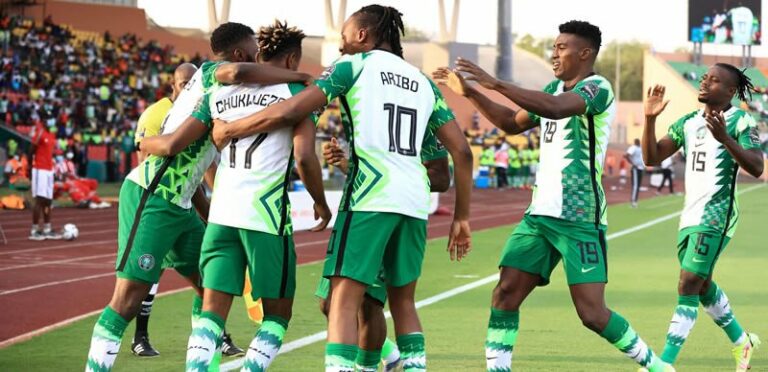
By Olanrewaju Akojede
Team Nigeria will begin a fresh phase of participation when the 2024 Paris Olympic Games begin on July 26 in Paris, France.
The Paris Olympics, which is its 33rd edition, is scheduled to end by Aug. 11 while the Paralympics is expected to hold from Aug.
28 to Sept. 8.Nigeria’s target is to put up a master class performance akin to its famous outing at Atlanta 96 Olympics where the country garnered six medals at the Games.
Nigeria is fielding a strong team of 82 sportsmen and women who will compete in 11 sports at the 2024 Games in Paris.
Track and Field is leading the contingent in terms of numbers with 32 athletes, consisting of 14 males and 18 females at the Games.
Nigeria will also be represented in Basketball, Badminton, Boxing, Canoeing, Cycling, Football, Table Tennis, Taekwondo, Weightlifting and Wrestling at the Paris Olympics.
With a total medal haul of two gold, one silver and three bronze at the 1996 Games in Atlanta, the country’s performance till date remained the first and only time that Team Nigeria won two gold medals in the Olympics.
Leading the medal zone was a fantastic brilliance of Chioma Ajunwa, who leaped to a 7.12 metres to set the record as the first West-African female athlete and the first Nigerian to win an Olympic gold medal in track and field.
Nigeria also created another memorable record by winning another gold medal in the male football event against all odds and against the big guns in the sport such as Brazil and Argentina.
Nigeria’s football team, tagged the ‘Dream Team’, was led in that epoch-making event by Kanu Nwankwo, the then African Footballer of the Year.
The team comprised other football greats such as the mercurial midfielder, Austin Okocha.
Their defensive wall was marshalled by Taribo West, Uche Okechukwu, Sunday Oliseh, and Celestine Babayaro, with attacking power play of Daniel Amokachi, Wilson Oruma and speedy winger Emmanuel Amuneke among others.
They went on to record an incredible comeback 3-2 win over Argentina in a dramatic final and claimed their first-ever gold in football at the Olympics.
Other success stories at the 1996 Olympics included a silver medal in the women’s 4x400m with the quartet of Falilat Ogunkoya, Olabisi Afolabi, Fatima Yusuf and Charity Opara.
Also, Nigeria’s woman of candour in sprints, Mary Onyali, powered to a silver podium finish in women’s 200m, while her compatriot, Ogunkoya, won a bronze in the women’s 400m.
Ace boxer Duncan Dokiwari won a bronze medal as well.
Since that historic performance about 28 years ago, subsequent performances in the quadrennial Olympics had been measured by the performances in the 1996 Games.
Till date, for Nigeria, no Olympics show has outperformed the 1996 spectacle.
Indeed, Nigerians had wondered why subsequent Team Nigeria failed to replicate the feat recorded at 1996 Olympics.
While the flag-off of the 2024 Olympics remains just a few days to go, Nigerians are, no doubt, expecting the present squad of 82 sportsmen and women to equal and surpass that record.
Nigeria’s powerful squad in athletics is led by the country’s Queen of the track and World Record holder, Oluwatobiloba Amusan, in company of Rosemary Chukwuma, Favour Ofili, Tima Godbless, Ella Onojuvwevwo in Women’s 400m as well as Esther Joseph, at the Games.
Others in the mix include Ruth Usoro (Women’s long jump); Ese Brume (Women’s Long jump); Prestina Oluchi Ochoogor, Obiageri Amaechi (Women’s discus); Ashley Anumba, Chioma Onyekwere, Oyesade Olatoye (Women’s hammer throw); Women’s 4×100 metres Relay and Mixed 4×400 metres relay.
Nigeria’s Super Falcon also returns to the show in the Football event with an 18-woman squad after several years’ absence.
The Super Falcons, in a tough group with Champions Spain, Brazil and former world champions Japan, are, however, tipped for a podium finish at the Games in spite of the odds against them.
According to the Secretary-General of Nigeria Olympic Committee (NOC), Tunde Popoola, Nigeria has a strong football team to scale through their group.
”Also, we expect medals in Athletics, Weightlifting and Wrestling. We will surprise Nigerians with bags of medals,” he said.
Another female team, D’Tigress will also aim to better their record in the female orBasketball event with their 12 players on parade.
Nigeria will also parade three boxers to be led by Olaitan Olaore, who aims for a good show in men’s heavyweight; Dolapo Omole, who will also compete in men’s featherweight category; and Cynthia Ogunsemilore, who reigns in the women’s lightweight class.
It is worthy of note that, for the first time since 2016, Nigeria will send three boxers to the Olympics
Also, Nigeria will have high hopes in Weightlifting relying on the form of Rafiatu Lawal and Adijat Olarinoye.
The 24-year-old Olarinoye is not new on the world stage as she has earlier won gold at the Commonwealth Games in Birmingham two years ago.
She will seek to make Nigerians proud at a bigger podium at the Paris Olympics.
In other sports Nigeria will have two women in Canoeing, one female representative in Cycling while Aruna Quadri with Olajide Omotayo will lead the men in table tennis alongside Offiong Edem and Fatima Bello in the women’s category.
Taekwondo will also feature one female; Weightlifting will have two females while Wrestling will have a male and five females for a total of six athletes.
Team Nigeria will be fielding 20 males and 62 females at the Paris games.
The Minister of Sports Development, Sen. John Owan-Enoh, knowing the task ahead and the need for Nigeria to improve on their performance has been talking and doing the work to get the athletes in top shape ahead of the quadrennial games to be hosted by France.
At the presentation of N100 million donated by the House of Representative members, the minister said that the aspiration of the ministry was to surpass the previous best Olympic record achieved in 1996, at the 2024 Olympic Games in Paris.
He also said that the cash contribution from the House of Representatives would go to athletes.
He also announced increased allowance and bonuses will accrue to the athletes.
Owan-Enoh said,”Just like it was with the African Games in Accra, Ghana, I will spell out from A-Z, the entitlements for our athletes.
”My aspiration is for the nation to surpass our previous record from our best Olympic Games performance in 1996.
”We’ve been working on this goal through our preparations, arrangements, and performance team working with athletes in Germany. I am getting reports on the progress every day.”
”We want to get our athletes to feel appreciated and wanted by our country.”
He also said,” The entire N100 million donations from the Federal House of Representatives will entirely go to the athletes.”
In addition to this, athletes will receive local camping allowance, foreign training grants, foreign training camp allowances, Olympic Games allowances, and winning bonuses.
The Minister also told newsmen in Abuja that the Federal Government had approved more than N12 billion for Team Nigeria at the 2024 Paris Games.
The Minister’s commitment to transparency and support for the athletes underscore the federal government’s dedication to ensuring Team Nigeria’s success at the Games.
As the clock ticked within a few days to the Paris 2024 Olympic Games, Owan-Enoh said that his ministry, as the supervising arm, was ticking all the boxes.
He said that the atmosphere was frenetic and excitement palpable as showmanship and calisthenics set the stage for the 2024 Olympic Games in Paris, France.
He said that Team Nigeria is in top spirits as it prepares to fly its colors at this quadrennial sporting showpiece of global attention.
He also said that Nigeria’s contingent encompasses talented and world-class athletes who are set to take the world by storm.
He said, ”With several months of preparation and training, athletes such as Oluwatobiloba Amusan, Ese Brume, Blessing Oborodudu, the two Favours (Ashe and Ofili), Odunayo Adekouroye, Chukwuebuka Enekwechi, Aruna Quadri, among other names too numerous to mention, the nation flies to Paris with strong hopes.”
Sen. Owan-Enoh also urged Nigerians to throw their weight behind the nation throughout the Games.
”Our athletes are putting in tremendous effort and dedication in their preparations.
”We are confident that with the support of every Nigerian, our team will excel and make the nation proud,” he said.
Owan-Enoh said that following the domestic camping, the contingent proceeded on foreign camping to acclimatise, focus and step up preparations for the Games.
”The Super Falcons camped in Spain, while the other athletes camped in Saarbrucken, Germany,” he said.
He also said that the prioritisation of the welfare of athletes had been demonstrated by the increase in bonuses and allowances payable to them.
”Additionally, domestic camping allowances, foreign training grants, foreign training allowances, Olympic Games allowances, and winning bonuses will be given to ensure our athletes are well-supported.
”Let’s unite in support of our athletes as they embark on this remarkable journey.
”Our aspiration is not just to participate but to excel and bring home the medals,” Owan-Enoh said. (NAN)

